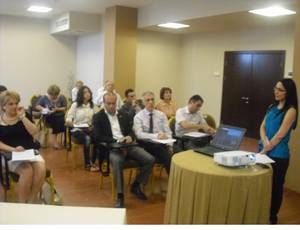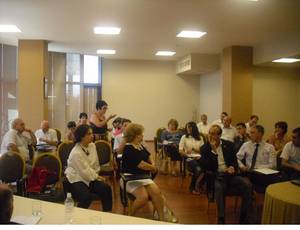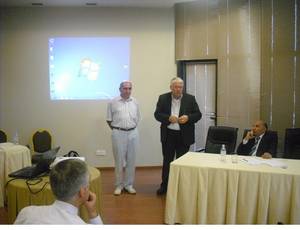Round Table Meeting
On 11 July 2013, a one-day round-table meeting on the environmental aspects of SHPP projects was organized under the GAF Renewable Energy Promotion Program. About 25 participants participated in the meeting, with representatives from:
• various NGOs committed to environmental protection
• the Ministry of Energy and Natural Resources
• the Ministry of Nature Protection,
• the Small Hydro’s Association
• Association of Young Environmental Lawyers
• KfW
• GAF
• GAF’s technical consultant.
The meeting was organized with the intention of exchanging experiences related to planning, construction and operation of SHPPs, and to identify ways for raising the awareness of environmental and social issues among all stakeholders of the SHPP sector.
All parties were invited to discuss possibilities for future cooperation.

After a presentation of the GAF Renewable Energy Programme and informative presentations by the participants the discussions started.

Several presentations and contributions vividly illustrated the missteps of some SHPP owners regarding environmental and social aspects. Concerns regarding hydropower in general were expressed. Examples of violations of existing legal norms, starting from the licensing procedure, like flawed public hearings; by way of construction, like felling too many trees; up to SHPP operation, like blocking fish passages; were presented as the public’s main concerns vis-à-vis SHPPs. It was also criticized that the passive attitude of relevant ministries and regulatory agencies in responding to alleged violations was inappropriate when dealing with these cases. Examples of this are very low fines, lack of enforcement, inadequate monitoring etc.
The experts from Fichtner contributed their viewpoints in consideration of applicable international standards and mechanisms for decision making processes, with public hearings, and regarding environmental protection. The audience was encouraged to put forward practical suggestions to improve the current situation in this sector. The representatives of KfW and GAF expressed their opinion that environmental and social aspects are an essential part of the programme and deserve close attention. They encouraged all participants of the meeting to contribute to the activities for better environmental protection and to combat violations of existing Armenian law.

At the end of the meeting, the principal demands and suggestions were summarized as follows:
• improvement of the public hearing process
• upgrading of legislation
• definition of methodologies for HSE impact assessment
• justified limitation of numbers of SHPPs in each river.
The participants were requested to send their suggestions for improving the GAF RE programme to GAF.
